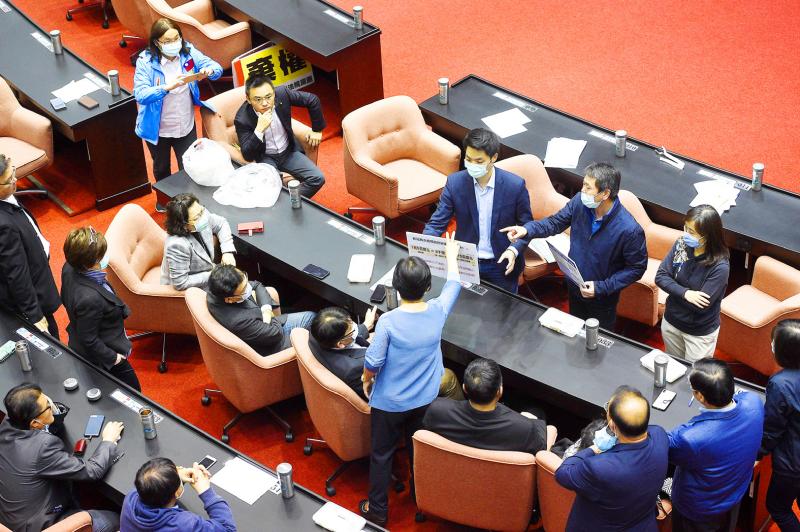A final review of draft amendments to the Act on COVID-19 Prevention, Relief and Recovery (嚴重特殊傳染性肺炎防治及紓困振興特別條例) was yesterday delayed after the Chinese Nationalist Party (KMT) caucus withdrew from cross-caucus negotiations in protest of the Democratic Progressive Party (DPP) caucus “twisting” its bailout proposals.
The Legislative Yuan yesterday morning held a second round of cross-caucus talks, and the DPP had scheduled for the amendments — which last week proceeded to second reading — to be reviewed during an afternoon plenary session.
The proposed amendments, if passed, would serve as the legal basis for the Executive Yuan’s proposal to raise the ceiling of the special budget for COVID-19 prevention, relief and recovery to NT$210 billion (US$6.98 billion).

Photo: George Tsorng, Taipei Times
As soon as the meeting began, KMT caucus secretary-general Chiang Wan-an (蔣萬安) presented a chart posted online by the DPP caucus, which contains wording that criticizes the KMT for pushing for the “indiscriminate” issuing of cash handouts to help people through the pandemic, without proposing any provisions for excluding high-income earners.
The KMT caucus was clear that the sizes of the proposed cash handouts should be inversely proportional to the amount of tax each household pays, but the DPP caucus deliberately twisted the KMT’s proposal, Chiang said, adding that it would refuse to proceed with the negotiations unless the DPP caucus retracted the chart and apologized.
The KMT caucus has proposed budgeting NT$100 billion for cash handouts, KMT caucus whip Lin Wei-chou (林為洲) said.
According to the proposal, households that are exempt from paying income tax would receive NT$20,000. Households subject to the 5 percent tax rate would receive NT$15,000; those subject to the 12 percent tax rate would receive NT$10,000; and those subject to the 20 percent tax rate would receive NT$6,000. Households subject to a rate of 30 percent or higher would not be eligible for a handout.
DPP caucus whip Ker Chien-ming (柯建銘) said that the logic behind the KMT’s proposal was “fundamentally flawed” because the tax rates were calculated based on last year’s incomes, and some people have only become jobless this year due to the pandemic.
In comparison, the Executive Yuan’s proposals target employers and workers who are hardest hit by the pandemic and are in most urgent need of relief, Ker said.
The KMT caucus held a news conference at which it unveiled its proposal while negotiations were ongoing on Monday, but the DPP had not been informed of them, he added.
The two caucuses then engaged in a heated exchange, prompting Legislative Speaker You Si-kun (游錫堃) to announce a break. Members of the KMT caucus later withdrew from the meeting.
The KMT’s withdrawal was tantamount to reneging on its agreement to forfeit the one-month period during which a caucus may freeze a bill, Ker said.
He said that he would ask Yu to call another round of negotiations tomorrow to hopefully pass the amendments on Friday.
Additional reporting by Hsieh Chun-lin

Alain Robert, known as the "French Spider-Man," praised Alex Honnold as exceptionally well-prepared after the US climber completed a free solo ascent of Taipei 101 yesterday. Robert said Honnold's ascent of the 508m-tall skyscraper in just more than one-and-a-half hours without using safety ropes or equipment was a remarkable achievement. "This is my life," he said in an interview conducted in French, adding that he liked the feeling of being "on the edge of danger." The 63-year-old Frenchman climbed Taipei 101 using ropes in December 2004, taking about four hours to reach the top. On a one-to-10 scale of difficulty, Robert said Taipei 101

Nipah virus infection is to be officially listed as a category 5 notifiable infectious disease in Taiwan in March, while clinical treatment guidelines are being formulated, the Centers for Disease Control (CDC) said yesterday. With Nipah infections being reported in other countries and considering its relatively high fatality rate, the centers on Jan. 16 announced that it would be listed as a notifiable infectious disease to bolster the nation’s systematic early warning system and increase public awareness, the CDC said. Bangladesh reported four fatal cases last year in separate districts, with three linked to raw date palm sap consumption, CDC Epidemic Intelligence

Two Taiwanese prosecutors were questioned by Chinese security personnel at their hotel during a trip to China’s Henan Province this month, the Mainland Affairs Council (MAC) said yesterday. The officers had personal information on the prosecutors, including “when they were assigned to their posts, their work locations and job titles,” MAC Deputy Minister and spokesman Liang Wen-chieh (梁文傑) said. On top of asking about their agencies and positions, the officers also questioned the prosecutors about the Cross-Strait Joint Crime-Fighting and Judicial Mutual Assistance Agreement, a pact that serves as the framework for Taiwan-China cooperation on combating crime and providing judicial assistance, Liang

US climber Alex Honnold left Taiwan this morning a day after completing a free-solo ascent of Taipei 101, a feat that drew cheers from onlookers and gained widespread international attention. Honnold yesterday scaled the 101-story skyscraper without a rope or safety harness. The climb — the highest urban free-solo ascent ever attempted — took just more than 90 minutes and was streamed live on Netflix. It was covered by major international news outlets including CNN, the New York Times, the Guardian and the Wall Street Journal. As Honnold prepared to leave Taiwan today, he attracted a crowd when he and his wife, Sanni,